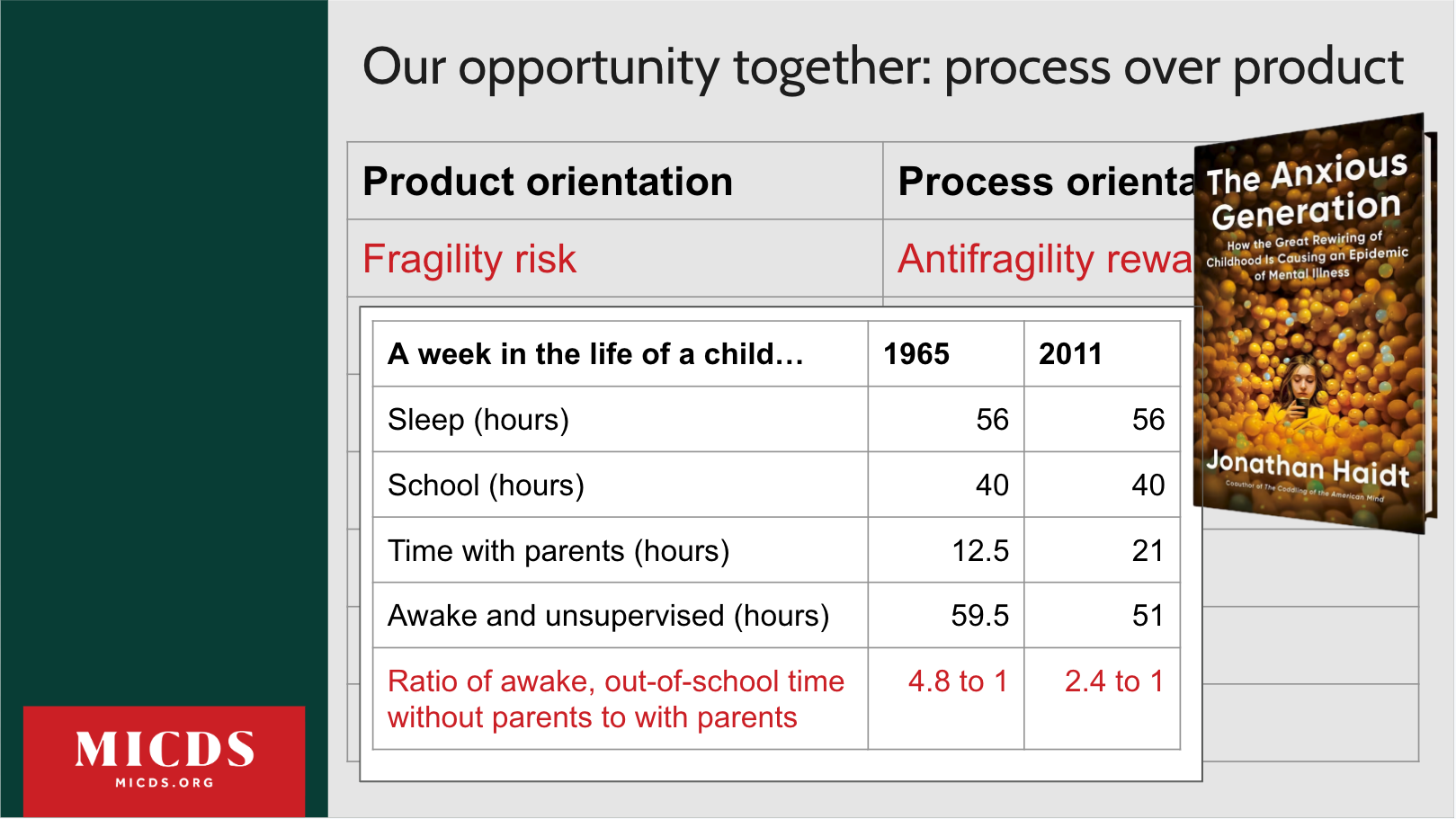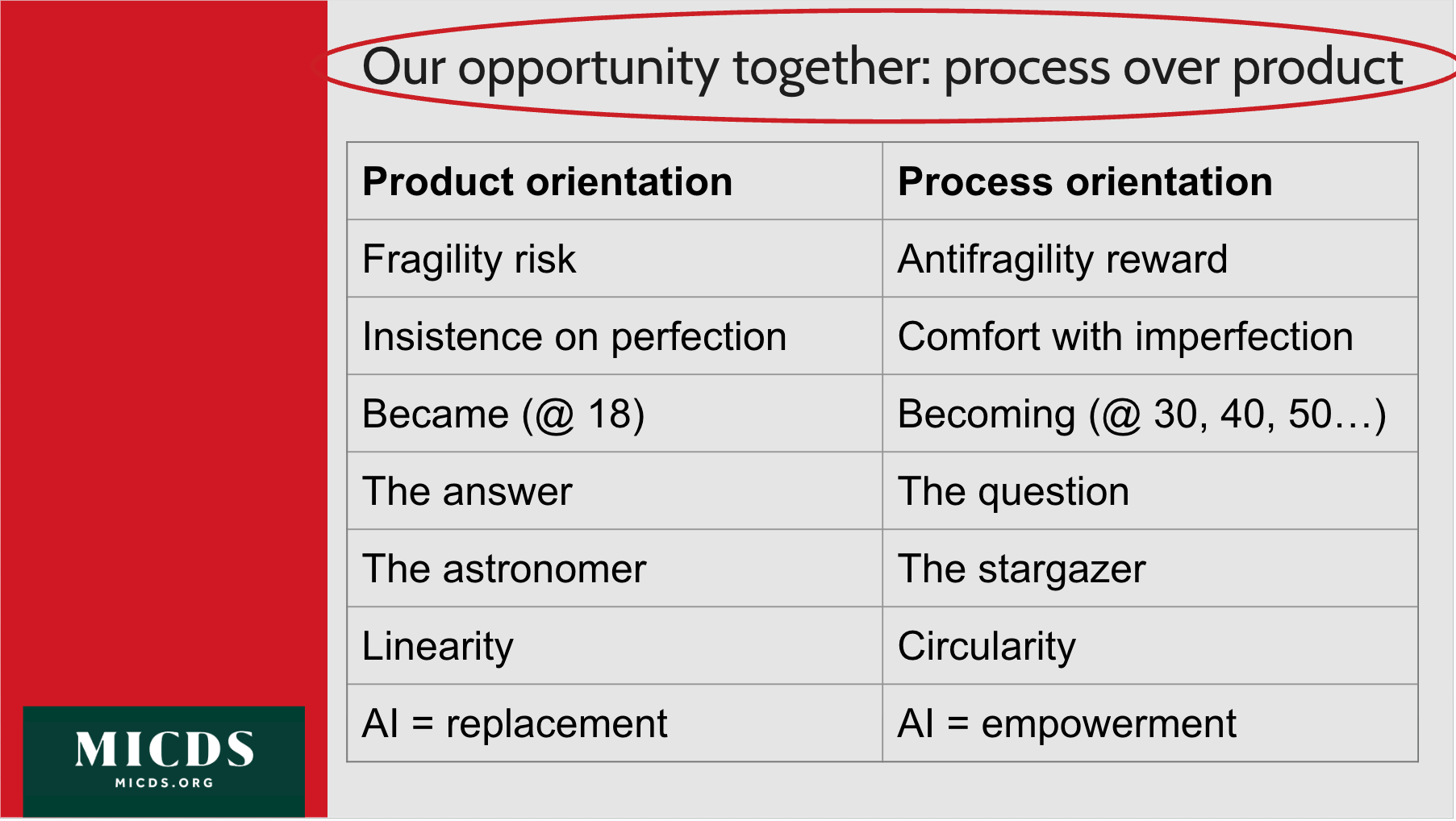The following letter is adapted from a presentation delivered at the Parents Association Spring Luncheon on Friday, April 25.
This year in the Upper School, I am very pleased to report, we have experienced far fewer serious disciplinary infractions than in the previous two years—fewer, in fact, than in any year since 2012-2013. I would like to believe that our decision to prohibit student cell phone use throughout the school day explains, at least in part, this extraordinary and healthy decline, given the extent to which interpersonal conflicts either started or stoked on social media have so often featured in student discipline cases in the past. I am confident that credit is also due to our students themselves, who take seriously the care and keeping of one another in our community.
Unfortunately, we have witnessed the opposite trend in Upper School honor code infractions, which have escalated significantly over the last three years. That this period overlaps with the launch of ChatGPT in November 2022 and the subsequent widespread adoption of it and other AI technologies is not a coincidence. Just as social media apps have proved a challenge to the integrity of our students’ relationships with one another, artificial intelligence is proving a challenge to their academic integrity. Moreover, whereas our faculty and staff can easily prohibit student use of cell phones on campus—the devices are not difficult to spot—we cannot so easily, nor necessarily should we, prohibit student use of AI. The enemy is not AI itself, which of course is a powerful tool; the enemy is misunderstanding AI as a substitute for human thought and creativity as opposed to an improver of them—misunderstanding it as a “product” tool instead of a “process” tool.
In so many respects, the opportunity we have together at MICDS is to learn to privilege process over product. A process mindset tolerates—even welcomes—setbacks. “If at first you don’t succeed, try, try again.” A product mindset is less resilient. The writer Ana Lorena Fabrega, referencing the work of Nassim Taleb on “antifragility,” reminds us that “the antifragile needs stress to thrive,” and that children are cases in point. “It is our job as educators and parents to continue cultivating their antifragility by not intervening when they face moderate stress,” she contends—to accept the process of their growth through stress and failure rather than short-circuit it by smoothing a path to a (now unearned) final product.
Jonathan Haidt’s The Anxious Generation, which helped to inspire our cell phone prohibition at MICDS and which remains, over a year after its publication, one of the bestselling books in the country, calls attention to the uptick in “parenting time” that has transpired since the early 1990s. The Pew Research Center reports that American parents spent an average of 21 hours per week with their children in 2011, up from 12.5 in 1965. While this additional 8.5 hours may not seem significant at first glance, when considered as a fraction of a child’s waking hours outside of school, its impact is considerable. The rise implies that, whereas a child in 1965 spent about 4.8 hours of after-school and weekend time without their parents for every hour spent with them, a child in 2011 spent only about 2.4 hours—a 50% decline in the ratio of “unparented” to “parented” time in American childhood. Because of the power imbalance that naturally obtains in every parent-child relationship, this prevailing increase in parented time relative to unparented time inevitably risks a product mindset over a process mindset in the affected child. Messy “process” behaviors like trial and error, adventurousness, experimentation, and play are far less comfortable to indulge when the boss is watching.

The culture of academically rigorous schools like MICDS also risks the cultivation of a product mindset. We work hard not to over-value the right answer, the perfect score, the flawless performance, the winning touchdown, and so forth in our curricular and extracurricular programs; but GPA, test scores, selective college admissions, championship seasons, and graduation awards are undeniably part of student life here. We must message ever more intentionally, therefore, the more durable lessons to be learned from a wrong answer, an imperfect performance, an unexpected loss, a fruitless endeavor, or a disappointing outcome. We aspire toward a distant time horizon at MICDS. We are far more interested in who our students will still be becoming decades from now, embodying the lasting imprint of such “process” lessons, than the ostensible “product” they have become only by the time they’re old enough for college.

I recall the myth of Sisyphus—the hubristic Greek mortal condemned by the gods to roll a stone up a hill repeatedly for all eternity—as understood by the French philosopher Albert Camus:
At the very end of his long effort, the purpose is achieved. Then Sisyphus watches the stone rush down toward that lower world whence he will have to push it up again toward the summit. He goes back down to the plain. It is during that return, that pause, that Sisyphus interests me. At each of those moments when he leaves the heights, he is superior to his fate. He is stronger than his rock. The struggle itself toward the heights is enough to fill the heart. One must imagine Sisyphus happy.
In my very first presentation to the MICDS faculty, in August 2019, I encouraged them always to esteem the human spirit over the mechanistic algorithm, kinesis over stasis, doubt over certainty, a process mindset over a product mindset. The encouragement bears repeating all the more in the world of ChatGPT and the temptations that our students now face to let it, or a similar technology, think for them—to let it and not them roll their heavy stones uphill. Should they succumb, what struggles, then, will fill their hearts? What fragile fate will they invite upon themselves?
Richard Wilbur’s poem The Writer is the myth of Sisyphus retold. I have shared it with you before. A father watches his daughter toil mightily at her typewriter. “The whole house seems to be thinking, / And then she is at it again with a bunched clamor / Of strokes, and again is silent.” Her stone rolls back down to the plain. He is reminded of a day when the two of them, years earlier, had opened a window in their home for a trapped and confused starling—another Sisyphean being—to find escape.
I remember…
how for a helpless hour, through the crack of the door,
We watched the sleek, wild, dark
And iridescent creature
Batter against the brilliance, drop like a glove
To the hard floor, or the desk-top,
And wait then, humped and bloody,
For the wits to try it again; and how our spirits
Rose when, suddenly sure,
It lifted off from a chair-back,
Beating a smooth course for the right window
And clearing the sill of the world.
Wilbur captures in these lines not merely the burden of being Sisyphus, but, more poignantly, the burden of being the mother or the father of Sisyphus, the teacher or the coach, helpless to labor at the stone in his stead. Because the work—the process—is for Sisyphus alone. He alone can fill his heart. I know of no more perfect distillation of the heartbreaking work of parenting than the stanza with which Wilbur concludes his poem, a powerless father’s love song:
It is always a matter, my darling,
Of life or death, as I had forgotten. I wish
What I wished you before, but harder.
The myth of Sisyphus is a warning about AI, if we will hear it. Richard Wilbur’s poem is also a warning about AI, if we will hear it. MICDS students must be encouraged by all of us—at school and at home alike—to keep their shoulders to the rock, to think and create and learn for themselves, and never to let a machine do it for them, never to let a machine deny them the happiness of their unique struggle toward their unique heights. “Process over product” must be our love song sung to them in chorus and without end.
Always reason, always compassion, always courage. I wish you a joyful weekend with your families.
Jay Rainey
Head of School
This week’s addition to the “Refrains for Rams” playlist: Fake Plastic Trees by Radiohead (Apple Music / Spotify)

